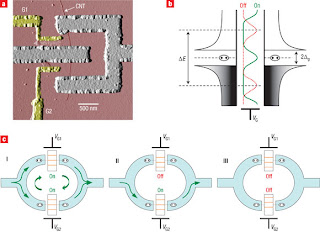As action potentials are generated in the heart or while we think, electromagnetic waves are generated. These waves are produced as a result of changing ionic fluxes in these organs. We have been capturing them through ECG, EEG and magneto-encephalograms (MEG) for quite some time. As science and technology advances, gadgets shrink, gadgets think, become more sensitive and specific.
When a electrically conducting piece of metal is kept in a magnetic field, the magnetic field will exert a force on the moving electrons that will push them to one side, creating a voltage differential in the conductor. This effect is known as Hall effect and has given the birth of many devices like Gaussmeter or magnetometer. Hall effect sensor ICs are used in many applications of electronics, requiring sensing of magnetic fields. (I found one Hall IC inside my floppy disk drive, at the periphery of the circular flywheel.) Sensing brain waves will not be easy using Hall ic though, as the device is not that sensitive.
Superconducting quantum interference devices (SQUID) are
 much more sensitive than the former. The intensity of brain's magnetic field just outside the skull varies from 0.1 to 1 picotesla, less than a hundred-millionth of Earth's magnetic field. SQUIDs consist of two liquid helium cooled superconductors sandwiching a piece of thin insulator, creating two Josephson junctions. The presence of any stray magnetic field gives rise to interference and is detected by SQUID probes. So sensitive is this technology that it is being used to probe biomagnetism, gravitational waves and other extremely weak phenomena. But it has its inherent weaknesses too. It is bulky, expensive, power hungry and needs to be cooled near absolute zero.
much more sensitive than the former. The intensity of brain's magnetic field just outside the skull varies from 0.1 to 1 picotesla, less than a hundred-millionth of Earth's magnetic field. SQUIDs consist of two liquid helium cooled superconductors sandwiching a piece of thin insulator, creating two Josephson junctions. The presence of any stray magnetic field gives rise to interference and is detected by SQUID probes. So sensitive is this technology that it is being used to probe biomagnetism, gravitational waves and other extremely weak phenomena. But it has its inherent weaknesses too. It is bulky, expensive, power hungry and needs to be cooled near absolute zero.Now scientists are devising gadgets that can operate near room temperature, handy and relatively inexpensive. A cell containing an alkali gas (like rubidium) will practically transmit all of a circularly polarized laser beam, when the spin of rubidium atoms point in the same direction. An object when placed near it, will distort the spins and some laser beam will be absorbed. Such vapor cells has sensitivity in the femtotesla range. Got to be more careful next time you see your wife carrying a strange object in her hand and getting closer to you (or your head!).
Last modified: never
Reference: hyper-links, unless specifically mentioned
No comments:
Post a Comment